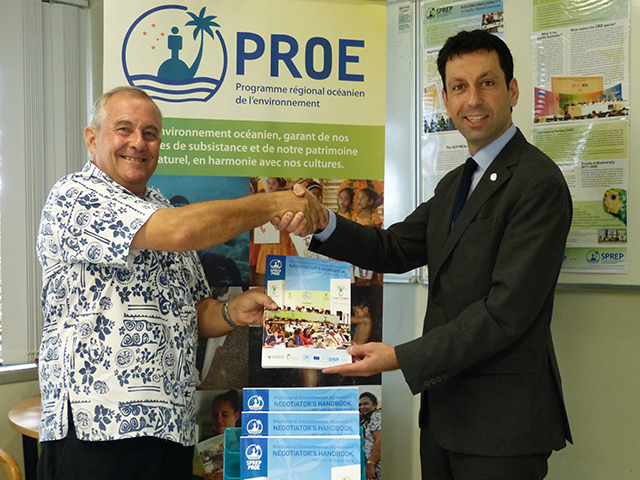
Environmental Monitoring and Governance
10 April, 2014: Apia, Samoa. The Multilateral Environmental Agreement Negotiator's Handbook for the Pacific Region was launched today by the Secretariat of the Pacific Regional Environment Programme (SPREP) and the United Nations Environment Programme (UNEP).
The handbook is a supplement to SPREP's Taking the Floor booklet, which has proven valuable for Pacific island Multilateral Environmental Agreement (MEA) negotiators.

Environmental agreements forged at international meetings are crucial to addressing the worst effects of environmental degradation and supporting our planet's biological diversity into the future. The United Nations Framework Convention on Climate Change (UNFCCC), the Convention on Biological Diversity (CBD) and the Montreal Protocol on Substances that Deplete the Ozone Layer are examples of the many multilateral environmental agreements to which Pacific islands are party.
The MEA Negotiator's Handbook provides advice on handling the complexities of international environmental governance.
The forums and processes required to achieve these outcomes often have a unique language - combining international policy, law and careful diplomacy.
"The skills required to successfully negotiate Multilateral Environmental Agreements such as the CBD and UNFCCC can be learned and honed," said Mr. David Sheppard, Director General of SPREP.
"As negotiation training workshops for Pacific island negotiators happen infrequently, we felt we needed this handbook to provide support in the interim. It guides individuals through the processes and skills required to improve the chances of achieving the desired outcome."
UNEP Regional Director for Asia Pacific, Mr Kaveh Zahedi, commended SPREP on this initiative and said that it was clear that MEAs would continue to be a large part of the work of SPREP, UNEP, national Ministries of Environment and the wider environment community.
Mr Zahedi noted the need for countries to be able to assess whether or not they should become party to an MEA and to understand the implications and obligations under each convention.
"Small Island Developing States and Pacific countries have shown a lot of leadership in MEAs particularly at the negotiations, so clearly there is capacity here in the islands. However, turnover is high and this capacity is in the hands of only a few; we are constantly outnumbered by massive delegations from other regions and therefore we need to be able to negotiate smarter," said Mr Zahedi.
"This will be an invaluable tool for both current and future negotiators in ensuring that the Pacific voice and views are loud and clear at international meetings."
The handbook, designed specifically for the Pacific region, was prepared by the New Zealand Centre for Environment Law (NZCEL), University of Auckland, in association with SPREP. The activity was funded by the European Union through its project titled "Capacity Building related to MEAs in African, Caribbean and Pacific (ACP) Countries", implemented by UNEP, and known as the ACP MEAs Project.
Copies of the Handbook will be distributed to the SPREP Member countries. Electronic copies can be downloaded from here.
The handbook is a supplement to SPREP's Taking the Floor booklet, which has proven valuable for Pacific island Multilateral Environmental Agreement (MEA) negotiators.

SPREP Director General, Mr David Sheppard, and UNEP Regional Director for Asia Pacific, Mr Kaveh Zahedi, launch the Multilateral Environmental Agreement Negotiator's Handbook for the Pacific Region.
Environmental agreements forged at international meetings are crucial to addressing the worst effects of environmental degradation and supporting our planet's biological diversity into the future. The United Nations Framework Convention on Climate Change (UNFCCC), the Convention on Biological Diversity (CBD) and the Montreal Protocol on Substances that Deplete the Ozone Layer are examples of the many multilateral environmental agreements to which Pacific islands are party.
The MEA Negotiator's Handbook provides advice on handling the complexities of international environmental governance.
The forums and processes required to achieve these outcomes often have a unique language - combining international policy, law and careful diplomacy.
"The skills required to successfully negotiate Multilateral Environmental Agreements such as the CBD and UNFCCC can be learned and honed," said Mr. David Sheppard, Director General of SPREP.
"As negotiation training workshops for Pacific island negotiators happen infrequently, we felt we needed this handbook to provide support in the interim. It guides individuals through the processes and skills required to improve the chances of achieving the desired outcome."
UNEP Regional Director for Asia Pacific, Mr Kaveh Zahedi, commended SPREP on this initiative and said that it was clear that MEAs would continue to be a large part of the work of SPREP, UNEP, national Ministries of Environment and the wider environment community.
Mr Zahedi noted the need for countries to be able to assess whether or not they should become party to an MEA and to understand the implications and obligations under each convention.
"Small Island Developing States and Pacific countries have shown a lot of leadership in MEAs particularly at the negotiations, so clearly there is capacity here in the islands. However, turnover is high and this capacity is in the hands of only a few; we are constantly outnumbered by massive delegations from other regions and therefore we need to be able to negotiate smarter," said Mr Zahedi.
"This will be an invaluable tool for both current and future negotiators in ensuring that the Pacific voice and views are loud and clear at international meetings."
The handbook, designed specifically for the Pacific region, was prepared by the New Zealand Centre for Environment Law (NZCEL), University of Auckland, in association with SPREP. The activity was funded by the European Union through its project titled "Capacity Building related to MEAs in African, Caribbean and Pacific (ACP) Countries", implemented by UNEP, and known as the ACP MEAs Project.
Copies of the Handbook will be distributed to the SPREP Member countries. Electronic copies can be downloaded from here.